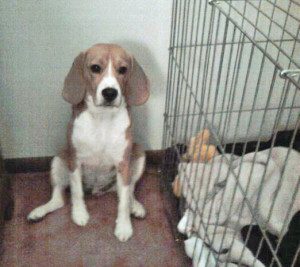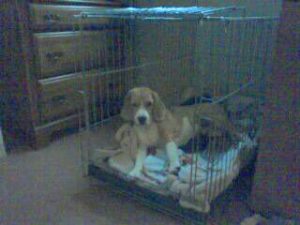 What are the benefits of crate training a puppy, you ask? Is crate training necessary? And what is involved in crate training? If you have a puppy, or plan on buying or adopting a puppy in Saratoga Springs NY in the near future, these may be some of the questions you have. Although crate training is not necessary for a happy, well-behaved dog, it can make life a heck of a lot easier for you, and give your puppy a serene place of their own. It can be very difficult to imagine during the first few frustrating days of crate training that the howling, barking, and scratching will actually stop and that your pooch will learn to like their crate. Believe it or not, however, if you crate train your puppy correctly, this will be the case!
What are the benefits of crate training a puppy, you ask? Is crate training necessary? And what is involved in crate training? If you have a puppy, or plan on buying or adopting a puppy in Saratoga Springs NY in the near future, these may be some of the questions you have. Although crate training is not necessary for a happy, well-behaved dog, it can make life a heck of a lot easier for you, and give your puppy a serene place of their own. It can be very difficult to imagine during the first few frustrating days of crate training that the howling, barking, and scratching will actually stop and that your pooch will learn to like their crate. Believe it or not, however, if you crate train your puppy correctly, this will be the case!
The benefits of crate training your puppy include:
• House-training! Until your puppy learns the rules of the house, a crate will limit where they can go and help to establish a routine. Feeding your puppy in the crate and then bringing him outside to use the bathroom is an effective way to house train. Expect that for at least a few weeks, you will need to get up a couple times each night to take your puppy outside.
• A place for quietude! Even high-strung puppies need some alone time (whether they know it or not). Remember, everything is new to your feisty and furry buddy, so make sure her crate remains a cozy place where she can unwind and process her daily events. Be advised that a crate should never be used as a form of punishment. Your pup’s crate should be a place of comfort to him and he should have nothing but nice thoughts about his little space.
• A well-mannered puppy! As much as we love to have our four-legged family members around us, there will be times when that just isn’t feasible (Aunt Betty is visiting and is allergic to dogs), and training your dog to go to his or her crate on command can be very useful.
• An easy traveler! A crate makes traveling with your pup so much easier by keeping them safe and easy to handle. Your trip to visit Grandma down in Florida is not the first time you want to try crating tyour puppy…he or she will not be a happy camper!
 Dogs or puppies should not be crated full-time! Puppies, especially, should not be left in their crate for longer than a couple of hours. Serious house-training difficulties can occur when puppies are forced to break their instinctive penchant for keeping their sleeping area clean. Remember, dogs are social animals that need daily exercise, so isolation should always be kept to a minimum. If you fail in socializing your puppy to the world around them, you may wind up with an anxious, fearful, and unfriendly dog.
Dogs or puppies should not be crated full-time! Puppies, especially, should not be left in their crate for longer than a couple of hours. Serious house-training difficulties can occur when puppies are forced to break their instinctive penchant for keeping their sleeping area clean. Remember, dogs are social animals that need daily exercise, so isolation should always be kept to a minimum. If you fail in socializing your puppy to the world around them, you may wind up with an anxious, fearful, and unfriendly dog.
How should you introduce the crate to your puppy? Since we only want to associate the crate with good things, you can start by putting treats and toys in it to encourage them to explore it. There is a good chance that your puppy will be fearful of the crate at first, so be patient and continue moving treats farther into it and then placing his meal in there with the door open. If you are concerned that your puppy is not responding appropriately to crate-training, contact a Saratoga Springs trainer for a little help or advice.
Expect that crate training is going to take lots and lots of patience! However, putting the effort in at the beginning is worth it and the result will be a well-behaved puppy that grows into a well-behaved dog and treasured family member.
IMPORTANT: When crate training your puppy, be sure to remove his or her collar before putting them inside of the crate. A kennel crate is a place of confinement and dog collars may be unsafe for your pup.
Good luck with your training!
